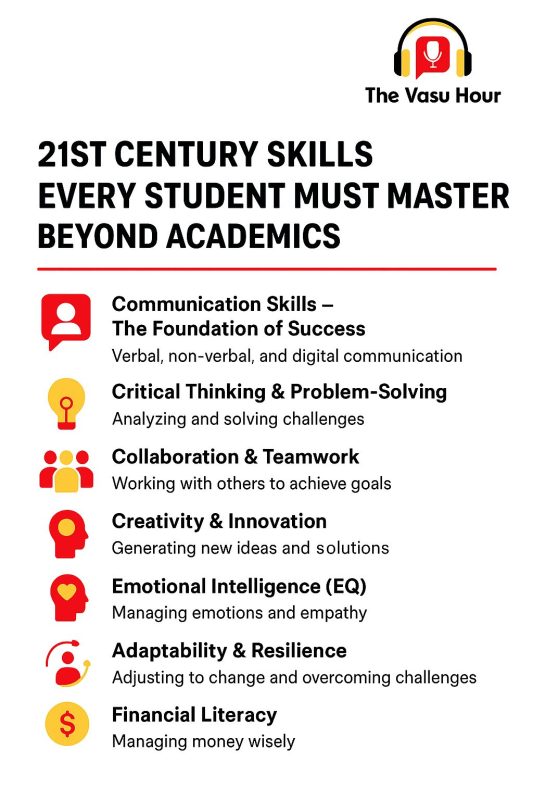When we consider the term education a typical image comes to mind of a student holding books, or cramming for a test, or simply a student working for grades.
But before we jump ahead at the thought of grades, let us take a step back and ask the bigger question: are these grades going to prepare children for the 21st century?
- As an educationist and Career Counsellor who has worked with thousands of students, who has spoken with dozens of teachers and parents, my answer is unequivocally no.
- While grades and academic success can give a student many opportunities, 21st century skills are what will determine how far a student can go after they leave those doors.
- Through their research they continue to mention creativity, problem solving, emotional/people skills, and adaptability as the essential skills for careers of the 21st century.
So, what are the 21st century skills? And why are all students required to develop these skills, rather to just do this through academic success? Let’s begin.
1. Communication Skills – The Foundation of Success
Today’s youth are living in a digital-first culture and at the same time are communicating as well as any previous generation. Most schools test kids in writing but not through authentic assessments and growth of the expressive communication skills.
- Verbal Communication – Writing will only get you so far; clear, confident, persuasive, effective speaking to others is what makes one a leader vs. a follower.
- Non-Verbal Communication – Eye contact, body language, gestures, can often convey more alive meaning than words.
- Digital Communication – The addition of e-mail etiquette, presence on the video call, and responsible use of social media is just another application of the skill.
A child who can articulate their thoughts clearly will always be able to perform better in interviews, presentations, or any leadership role.
2. Critical Thinking & Problem-Solving
Work looks uncertain. What is certain is, we want to solve problems. Critical Thinking encourages learners to ask questions, apply logic, analyze and evaluate rather than accepting information as it is presented. Problem-solving encourages learners to think through a problem in a logical, open, and calm manner. Consider an example of misinformation in an online message sent to your email account. A critical thinker will not just pass the email on to a friend, they will say “what is the source of this information”? Instead of sending the email, they will always reference the original source and question how valid the information is. This single skill is what might separate a responsible citizen from a seeking-no-action passive citizen.
3. Collaboration & Teamwork
While we each assess students as individual children in a classroom, students learn through the contributions from the whole collective. They need to be able to learn how to accept the perspectives of others, own the decisions they are making, and resolve conflicts with respect and without disruption. Working with a group is where we develop empathy, teamwork, and flexibility – primary skills that employers expect workers to have when they are working together through cross-functional teams or otherwise working with groups of people.
To borrow a phrase I think I tell parents every week: A child who is exposed to collaborative working skills as part of their classroom experience will, as an adult, transition to their job constructively and smoothly, regardless of what that job is.
4. Creativity & Innovation
The automation and artificial intelligence wave has displaced many routine jobs, but one thing that machines will never replace is human imagination.
- Creativity is universal. It is not only relevant to visual or performing arts, but also relevant to science, business, and problem solving in general.
- Innovation is taking creativity to get solutions, and could range from developing an app, to a unique story, or a business idea.
When students participate in a hobby, write, perform, or experiment, it generates innovation.
5. Emotional Intelligence (EQ)
As a psychologist who works mostly with kids, I can’t stress this enough: Emotional intelligence is most often more important than IQ.
- Students who are aware of their emotions, can self-soothe when their stress starts to rise, and can feel empathy are going to be able to form more interpersonal relationships.
- Emotional intelligence can also come in handy in the context of leadership, teamwork, and resolving conflicts.
A high-EQ student is not only likely to be a better learner but also a better person.
6. Adaptability & Resilience
The great constants of the 21st century – change is the greatest. From technological disruptions to global pandemics, life has become about adapting.
- Adaptability gives students the ability to welcome new circumstances and confront them in confidence.
- Resilience is what allows them to be humble in failure, and it enables them to be built up.
Now imagine the strength of a generation who does not reject change, but embraces it.
7. Financial Literacy
Most students leave school having never learned how to manage their money – an essential skill required in the real world that is arguably more valuable than advanced calculus.
- The fundamentals of budgeting, saving, investing, and how to responsibly manage credit should be taught to students early in their education.
- Teaching children financial literacy not only helps them achieve independence, it helps keep them out of debt trouble later on.
When a teenager can understand compound interest better than they understand peer pressure, they are indeed ahead of the game.
8. Digital Literacy & Online Responsibility
- Inescapably students will develop into digital natives, but tech or digital savvy students still are unfamiliar with what it means to be digitally responsible.
- Students need to understand cyber safety, the concept of digital footprints, fact checking procedures, and ethical behavior online.
- In this current era of A.I. and misinformation this is becoming one of the most valuable life skills.
9. Leadership & Initiative
Leadership is a matter of responsibility and not power.
- We want to get students to take small initiatives, lead projects and help each other.
- In doing so we are developing decision-making, responsibility and confidence.
Even within a classroom project, a child takes initiative, without authority, and begins to develop a disposition of leadership.
10. Global Citizenship & Cultural Awareness
The links of communication in our world are unlike any we have experienced. In mere months or years students today will be working with teams from across the world.
Preparing as global citizens will include understanding diversity and cultural differences, and what it means to go beyond borders.
Global citizenship is taking responsibility for our surroundings and our communities.
This way of thinking promotes citizenship in a global context as opposed to just professional citizenship.
The Way Forward: Beyond Marks, Toward Mastery
The wave of the future will be filled with students who are weaving together academic content and the skills for the 21st century.
Schools also need to create a structure of learning that models skills based learning. Parents also need to create conditions in their home practice for students to be curious, to persevere, and to express themselves. When students fuse these skills into their identity, they see educational experiences as places they are empowered instead of places we force them to take tests.If children apply, understand, and act with the competencies in the contexts, they are level 1 not just to find careers, but to live.
Final Thought (Your view as an Expert):
As an educator and welfare officer, I do not see success in the based number of marks a student receives. I see success in their ability to think, communicate, adapt, and lead in a very volatile environment. We can no longer solely follow a prescribed academic curriculum. We have to equip our children to be confident, compassionate, and competent human beings.

